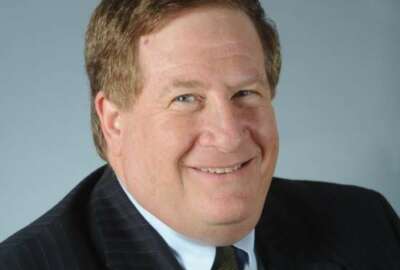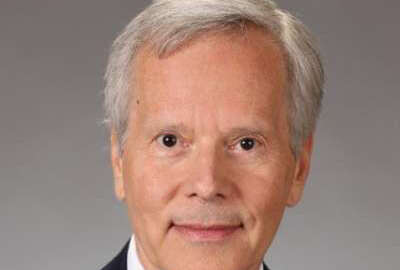

Best listening experience is on Chrome, Firefox or Safari. Subscribe to Federal Drive’s daily audio interviews on Apple Podcasts or PodcastOne. A Trump adm...
Best listening experience is on Chrome, Firefox or Safari. Subscribe to Federal Drive’s daily audio interviews on Apple Podcasts or PodcastOne.
A Trump administration executive order last month ordered agencies to assess whether contractors use foreign workers, and whether they displace Americans or cause national security concerns. The reporting burden is on agency heads, but the order has big implications for contractors. With analysis, Stinson LLP law firm partner Eric Whytsell joined Federal Drive with Tom Temin.
Interview transcript:
Tom Temin: Mr. Whytsell, good to have you on.
Eric Whytsell: Nice to be here.
Tom Temin: So what’s your analysis of this? First of all, what types of contractors do you think they’re concerned with here? I mean, there are landscaping contractors that may have lots of immigrants working for them perhaps, or is it really professional services that have foreign workers that are really good in programming?
Eric Whytsell: My sense is that it’s the latter. It’s for example, maybe someone from India with specialized coding skills or something in the IT services field. This appears to be connected to a bit of a scandal within the administration involving the Tennessee Valley Authority, where the TVA had to backtrack on the use of what was really a very small number of IT services folks on H1Bs. They went out, they basically hired one of the large consulting firms and those firms had the H1B visa, they had their workers, they were assigned, and TVA at the same time was laying off us employees. And so it became a big brouhaha. And I think that that’s really the primary thrust. But as written, the executive order would cover even more.
Tom Temin: I mean, there’s been some back and forth to hasn’t there over the numbers of H1B visas allowed. The administration and Congress and the industry have all kind of had a three way tug of war here, haven’t they?
Eric Whytsell: Absolutely — and there is, at least there has been, within the administration, a real push to limit the number of H1Bs. The US Chamber thinks that’s a bad idea. I think people in Congress are on both sides of the debate. But this does appear to be related to that. And I think that one of the potential outcomes really is the information gathered through the process required by the executive order might be used to further restrict the use of H1B visas, particularly by government contractors.
Tom Temin: And what information specifically first of all does the agency heads have to gather? It sounds like a pretty big reporting burden on their part.
Eric Whytsell: So the agency has have 120 days, so not very long, to review, to the extent practicable, contracts from 2018 and 2019 and assess the extent to which the contractors are using H1B temporary foreign labor to perform those contracts to the United States, and whether contractors including subcontractors are performing contracts in foreign countries that were formally performed within the United States using US workers. I’m not convinced that the agency will necessarily have full visibility into that data. They’ve only got four months to collect it. They’re supposed to be assessing the negative impact on the economy and on the efficiency of the federal procurement system, and also national security. And then the report within 120 days is supposed to include any corrective actions that the agency heads recommend be taken. So that seems like a fairly heavy lift. They’re also supposed to look at their own employees, that is the federal employees, and review the agency employment practices to make sure that executive order 11935, which has to do with competitive examination for federal service that US citizenship requirements are being conformed to. And so all of that is supposed to be in this report to the director of Office of Management and Budget.
Tom Temin: Well that is a heavy lift, and either they can make it up or do some kind of a horrible fire drill. It sounds to me like this could all devolve on the contractors? Is that your perception?
Eric Whytsell: It’s certainly possible. And I think some would argue likely that there will be some fallout for contractors. In the short term during the next four months, there’s really nothing that the contractors can or should do except to be on the lookout for what will come later and to be aware and to understand that this data, which I’m of the opinion is almost necessarily going to be flawed, it won’t be comprehensive, it’ll be sort of dirty data that the agency heads are able to actually collect within the short amount of time. And the concern is that the bad data will lead to bad policy decisions. And in some cases, I think you could argue that there’s a potential for a solution in search of a problem. One of the things that’s important to remember underlying the entire executive order is this notion that there’s a substitution for US workers, a substitution of foreign H1B visa holders for US workers. But they’re already in immigration law measures in place that require the employer who is applying for the H1B visa to prove that it cannot fill the position in question with a US employee. And so there’s a bit of a disconnect just at the beginning underlying the entire executive order. So there’s really is a possibility we’re going to collect bad data, and then base decisions on bad data that may be driven more by policy preferences than what the data actually shows.
Tom Temin: Yeah, you’ve answered my next question. And that is these people have already been vetted under law that are working in these contractors to begin with. So it’s kind of a backdoor way of undoing what is a legal process. And I’m wondering also too, if there are say Chinese employees, and I’ve come across many of them and contractors, and in the government itself, who might be on visa of some kind or a green card. And so I’m sensing that this could get caught up in the whole Chinese cybersecurity dispute that involves those contractors that have been banned, the equipment contractors.
Eric Whytsell: I think you’re right. That may very well be the case. You and I both know that there’s plenty of government action right now looking into Chinese employees, Chinese companies, Chinese suppliers of equipment, etc. I think a cynic would say that’s basically been covered. I mean, there are in many different contracts rules that you have to use US citizens, particularly sensitive, certainly classified contracts, but other sensitive contracts. Some of these rules are already in place. And I think if you’re talking about sophisticated contractors who are used to dealing with the federal government and these China related prohibitions. They would not be seeking, seems to me, they would not be seeking Chinese H1B visa holders to fill positions that would be involved in performing those contracts.
Tom Temin: And so other than giving the notice to be on alert for all of this that might be coming down the road, is there anything else that you can tell contractors that they should be doing?
Eric Whytsell: I think the only thing I would say is for contractors for whom H1B visa employees are particularly integral or vital to their ability to perform their contracts, they really need to be more proactive. What I said earlier was they need to be on the lookout. But certainly I think there’s a place to try to get ahead of what is happening. I mentioned the US Chamber, I know there are industry associations that very much care about the H1B visa numbers and are already fighting the restriction and the limitation on the numbers, the decrease, and I think working with groups like that or working on their own. Contractors would be well advised, if H1B temporary foreign workers are important to what they’re doing, to be working to address those issues and to preserve and establish the importance of the program with the government, regardless of this executive order and what’s going on.
Tom Temin: Eric Whytsell is a partner at the Stinson LLP law firm. He specializes in government contracts and cybersecurity. Thanks so much for joining me.
Eric Whytsell: Alright. Thank you for having me.
Copyright © 2024 Federal News Network. All rights reserved. This website is not intended for users located within the European Economic Area.
Tom Temin is host of the Federal Drive and has been providing insight on federal technology and management issues for more than 30 years.
Follow @tteminWFED



